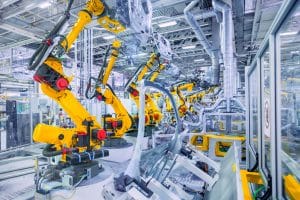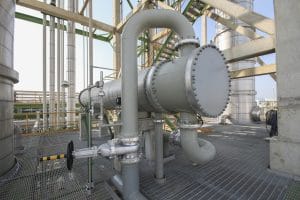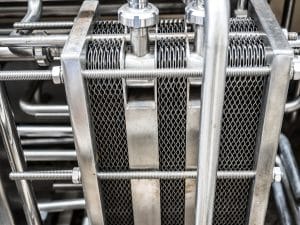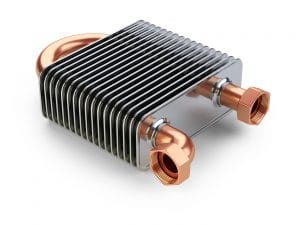 For manufacturing and many other industries, heat exchangers are a well-known and often relied-upon solution for cooling electrical control panels and other large equipment. No matter the size of the application, more efficient and eco-friendly heat exchangers save companies significant amounts of time, money, and effort on essential thermal management. When heat exchanger concepts are miniaturized and applied to high-performance computing technology, they offer the same level of reliability and sustainability as they do for larger electrical enclosures. With the ability to rapidly transfer high amounts of waste heat continuously and without constant maintenance, heat exchangers continue to help high-performance computing technology become even more powerful. (more…)
For manufacturing and many other industries, heat exchangers are a well-known and often relied-upon solution for cooling electrical control panels and other large equipment. No matter the size of the application, more efficient and eco-friendly heat exchangers save companies significant amounts of time, money, and effort on essential thermal management. When heat exchanger concepts are miniaturized and applied to high-performance computing technology, they offer the same level of reliability and sustainability as they do for larger electrical enclosures. With the ability to rapidly transfer high amounts of waste heat continuously and without constant maintenance, heat exchangers continue to help high-performance computing technology become even more powerful. (more…)
A Few Eco-Friendly Aspects of Modern Heat Exchangers
 Efficiency and optimum productivity are among the most important factors of success for virtually any company. However, eco-friendliness is becoming increasingly more important not just for success, but also for overall sustainability. In the quest to implement cleaner, more sustainable practices, many companies turn to modern heat exchangers for a wide variety of thermal management needs. From cooling electrical control panels to facilitating processes like food sanitization, pharmaceutical chemistry, and more, the many eco-friendly aspects of heat exchangers make them a significant addition to most industries’ sustainability efforts. (more…)
Efficiency and optimum productivity are among the most important factors of success for virtually any company. However, eco-friendliness is becoming increasingly more important not just for success, but also for overall sustainability. In the quest to implement cleaner, more sustainable practices, many companies turn to modern heat exchangers for a wide variety of thermal management needs. From cooling electrical control panels to facilitating processes like food sanitization, pharmaceutical chemistry, and more, the many eco-friendly aspects of heat exchangers make them a significant addition to most industries’ sustainability efforts. (more…)
The Relationship Between Automation and Heat Exchangers
 With the ability to transfer electrical waste heat rather than overwhelming it with cold air, heat exchangers changed the way many companies think of thermal management by making it a much more affordable endeavor. Reduced energy usage and fewer maintenance concerns meant companies saved large amounts of money that could be reinvested elsewhere, propelling their growth and success. Yet, in addition to lower operating costs, heat exchangers also changed several industries by making it possible to evolve further and implement automated technology. The concepts of eco-friendly and highly reliable thermal management solutions that were made popular by heat exchangers also paved the way for technology that also operates with minimal waste or human input. (more…)
With the ability to transfer electrical waste heat rather than overwhelming it with cold air, heat exchangers changed the way many companies think of thermal management by making it a much more affordable endeavor. Reduced energy usage and fewer maintenance concerns meant companies saved large amounts of money that could be reinvested elsewhere, propelling their growth and success. Yet, in addition to lower operating costs, heat exchangers also changed several industries by making it possible to evolve further and implement automated technology. The concepts of eco-friendly and highly reliable thermal management solutions that were made popular by heat exchangers also paved the way for technology that also operates with minimal waste or human input. (more…)
How Are Heat Exchangers Used in the Food & Beverage Industry?
 The point of modern heat exchangers is to safely and reliably transfer heat. In the food and beverage industry, that ability is vital to several different processes. For instance, eradicating harmful microbes from dairy and other products relies on rapidly and precisely transferring heat, as does the continued operation of the equipment needed to process such products. From electrical waste heat management to ensuring safety and quality in every product, the food and beverage industry has been one of the biggest benefactors of modern heat exchanger technology. (more…)
The point of modern heat exchangers is to safely and reliably transfer heat. In the food and beverage industry, that ability is vital to several different processes. For instance, eradicating harmful microbes from dairy and other products relies on rapidly and precisely transferring heat, as does the continued operation of the equipment needed to process such products. From electrical waste heat management to ensuring safety and quality in every product, the food and beverage industry has been one of the biggest benefactors of modern heat exchanger technology. (more…)
What Improves with the Use of Heat Exchangers?
 Effective thermal management for industries like manufacturing and power plants has always been a challenge. To meet it, companies used to have to rely on costly, sometimes unreliable solutions like air conditioners. Fortunately, today’s electrical waste heat management can often be much simpler and cost-effective, especially with the help of advanced heat exchangers. Rather than grudgingly accepting the high costs of traditional thermal management techniques, companies can improve a number of areas of operations by upgrading their cooling solutions to advanced heat exchangers. (more…)
Effective thermal management for industries like manufacturing and power plants has always been a challenge. To meet it, companies used to have to rely on costly, sometimes unreliable solutions like air conditioners. Fortunately, today’s electrical waste heat management can often be much simpler and cost-effective, especially with the help of advanced heat exchangers. Rather than grudgingly accepting the high costs of traditional thermal management techniques, companies can improve a number of areas of operations by upgrading their cooling solutions to advanced heat exchangers. (more…)
How These Technologies Benefit from Heat Exchangers
 Ever since they were first introduced to the mainstream as efficient alternatives to air conditioners, heat exchangers have continued to transform the realm of electrical thermal management. For example, manufacturing facilities can now operate continuously without worrying about equipment overheating or energy costs skyrocketing. In fact, heat exchangers have been so successful that virtually every industry now has multiple uses for them, and in many cases, they’ve helped make possible the evolution of advanced technologies. (more…)
Ever since they were first introduced to the mainstream as efficient alternatives to air conditioners, heat exchangers have continued to transform the realm of electrical thermal management. For example, manufacturing facilities can now operate continuously without worrying about equipment overheating or energy costs skyrocketing. In fact, heat exchangers have been so successful that virtually every industry now has multiple uses for them, and in many cases, they’ve helped make possible the evolution of advanced technologies. (more…)
Can Heat Exchangers Improve an Existing Application?
 Thermal management is a vital component to any electrical equipment or technology. As such, most application’s function optimally when an appropriate thermal management solution is considered during the design process. Yet, existing machinery, control panels, and other forms of technology can also benefit greatly from cleaner, more efficient, and more reliable ways of managing electrical waste heat, especially those that have previously relied on solutions such as air conditioning. To help companies save on thermal management costs without having to unnecessarily replace equipment, heat exchangers can often be fitted to existing applications in a variety of industries. (more…)
Thermal management is a vital component to any electrical equipment or technology. As such, most application’s function optimally when an appropriate thermal management solution is considered during the design process. Yet, existing machinery, control panels, and other forms of technology can also benefit greatly from cleaner, more efficient, and more reliable ways of managing electrical waste heat, especially those that have previously relied on solutions such as air conditioning. To help companies save on thermal management costs without having to unnecessarily replace equipment, heat exchangers can often be fitted to existing applications in a variety of industries. (more…)
How Heat Exchangers Transfer Heat
 The secret behind how heat exchangers revolutionized electrical thermal management lies in their efficient, eco-friendly methods of transferring waste heat. For instance, instead of actively chilling the air inside of an electrical enclosure, a heat exchanger’s fluid can absorb the heat and transfer it safely away from components that could be damaged by it. Depending on the specific application, heat exchanger technology can be applied in several ways, such as heat spreading, conduction, natural/forced convection, or a combination of these and other techniques. (more…)
The secret behind how heat exchangers revolutionized electrical thermal management lies in their efficient, eco-friendly methods of transferring waste heat. For instance, instead of actively chilling the air inside of an electrical enclosure, a heat exchanger’s fluid can absorb the heat and transfer it safely away from components that could be damaged by it. Depending on the specific application, heat exchanger technology can be applied in several ways, such as heat spreading, conduction, natural/forced convection, or a combination of these and other techniques. (more…)
The Modern Science of Thermal Management Design
 The science of electrical thermal management grows more complex every time new technology is developed or old technology is improved upon. Typically, new technologies are more powerful than their predecessors, and therefore, need higher performing heat transfer methods. However, new applications are also generally smaller than those before them, which means their thermal management solutions also have to fit into tighter spaces. To effectively and efficiently meet the changing demands of innovative technology, heat exchangers are often the ideal thermal management solution. Designing more powerful thermal management solutions is easier and less time-consuming when the designs are based on proven, highly customizable technology, such as heat exchangers. (more…)
The science of electrical thermal management grows more complex every time new technology is developed or old technology is improved upon. Typically, new technologies are more powerful than their predecessors, and therefore, need higher performing heat transfer methods. However, new applications are also generally smaller than those before them, which means their thermal management solutions also have to fit into tighter spaces. To effectively and efficiently meet the changing demands of innovative technology, heat exchangers are often the ideal thermal management solution. Designing more powerful thermal management solutions is easier and less time-consuming when the designs are based on proven, highly customizable technology, such as heat exchangers. (more…)
Why Companies Rely on Heat Exchangers
 The heat exchanger market has become a worldwide industry as more and more companies rely on them for a variety of thermal management needs. In addition to cooling electrical control cabinets, which made heat exchangers famous, the technology is now used for broad range of applications throughout virtually every industry. The reason companies continue to rely on heat exchangers is because they continue to help reduce overall costs and improve productivity as they advanced along with more powerful technology. That means even as manufacturing equipment and other technologies grow more powerful, heat exchangers continue to be able to effectively and efficiently meet their high-performance thermal management demands. (more…)
The heat exchanger market has become a worldwide industry as more and more companies rely on them for a variety of thermal management needs. In addition to cooling electrical control cabinets, which made heat exchangers famous, the technology is now used for broad range of applications throughout virtually every industry. The reason companies continue to rely on heat exchangers is because they continue to help reduce overall costs and improve productivity as they advanced along with more powerful technology. That means even as manufacturing equipment and other technologies grow more powerful, heat exchangers continue to be able to effectively and efficiently meet their high-performance thermal management demands. (more…)







